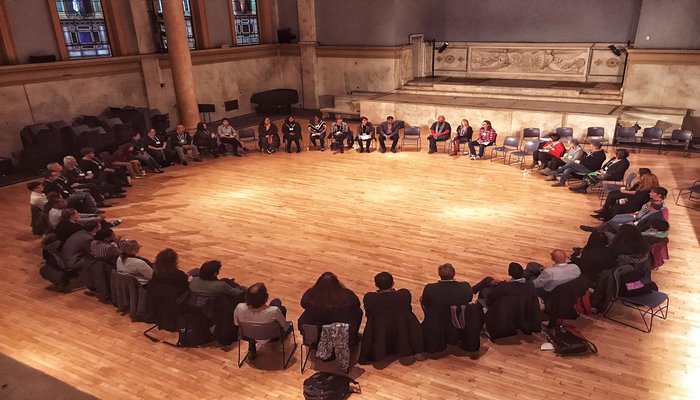
On behalf of TCG’s Department of EDI Initiatives, I'm pleased to invite all Fall Forum on Governance attendees and NYC-area TCG Members to join us for a special gathering hosted by Cohort 3 of the EDI Institute from 1:30-4pm on Friday, November 8 at Project REACH. As you may know, the EDI Institute supports cohorts of theatres going through a multi-year peer-learning process to advance equity at the personal, organizational, and fieldwide levels. To make this work more accessible to a wider number of participants, Cohort 3 is hosting two affinity spaces that are free for Fall Forum attendees:
- Affinity space for POCs and PWTs: One of the greatest resources POCs have in navigating workplace dynamics at PWTs is other POCs going through similar challenges. This is an open, un-agendized space for POCs to build community, share challenges and opportunities, and nourish and lift up each other’s work. Email Ciara Smith at csmith@tcg.org to RSVP.
- Anti-racism learning space for White folks: Building on her highly-rated Words, Words, Words session at the 2019 TCG Conference, Corinna will lead a deep dive into key anti-racism terms and how they translate into action and accountability. Members of Cohort 3 theatres will share examples of struggles and breakthroughs at their own theatres. Held Email Corinna at cschulenburg@tcg.org to RSVP.
Space in both meetings is limited, so please RSVP today!
What are affinity spaces? Here is TCG's working definition:
Affinity spaces are for people who self-identity as part of a particular group to discuss their collective experiences. Because members of oppressed groups are often asked to educate and protect the comfort of those with privilege, affinity groups are necessary in equity-based work to provide space for the conversations that cannot occur in the presence of those power dynamics.
Here is more context around why affinity spaces can be so important:
From “Age, Race, Class, and Sex: Women Redefining Difference,” Audre Lorde, Sister Outsider
"Traditionally, in american society, it is the members of oppressed, objectified groups who are expected to stretch out and bridge the gap between the actualities of our lives and the consciousness of our oppressor. For in order to survive, those of us for whom oppression is as american as apple pie have always had to be watchers, to become familiar with the language and manners of the oppressor, even sometimes adopting them for some illusion of protection. Whenever the need for some pretense of communication arises, those who profit from our oppression call upon us to share our knowledge with them. In other words, it is the responsibility of the oppressed to teach the oppressors their mistakes…There is a constant drain of energy which might be better used in redefining ourselves and devising realistic scenarios for altering the present and constructing the future.”
White Experience of Racial Affinity Groups, White Fragility, Robin DiAngelo
“Generally, people of color appreciate this opportunity for racial fellowship, but white people typically become very uncomfortable, agitated and upset - even though this temporary separation is in the service of addressing racism. Responses include a disorienting sense of themselves as not just people, but most particularly white people; a curious sense of loss about this contrived and temporary separation which they don’t feel about the real and on-going segregation in their daily lives; and anxiety about not knowing what is going on in the groups of color. The irony, again, is that most whites live in racial segregation every day, and in fact, are the group most likely to intentionally choose that segregation (albeit obscured in racially coded language such as seeking “good schools” and “good neighborhoods”).”